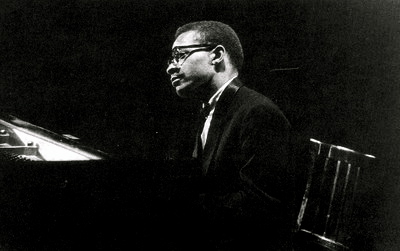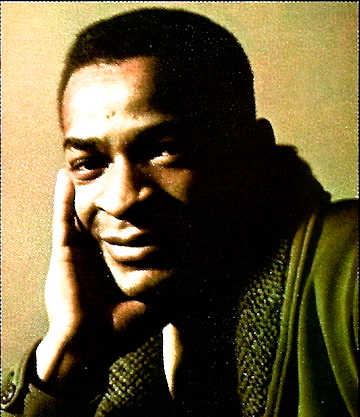
Phineas Newborn Jr. (Pianist) born on December 14, 1931 in Whiteville, Tennessee and passed on May 26, 1989 in Memphis, Tennessee at the age of 57.
Newborn came from a musical family with his father, Phineas Newborn, Sr., being a blues musician and his younger brother, Calvin, a jazz guitarist. Phineas studied piano as well as trumpet, and tenor and baritone saxophone.
Newborn first played in an R&B band led by his father on drums, Tuff Green on bass and his brother Calvin on guitar. The group recorded as B. B. King’s band on his first recordings in 1949 and also the Sun Records sessions in 1950. The group would leave West Memphis in 1951 to tour with Jackie Brenston as the “Delta Cats” in support of the record “Rocket 88″. Rocket 88 is considered by many to be the first rock & roll record ever recorded (recorded by Sam Phillips) and was the first Billboard #1 record for Chess Records. Among his earliest recordings, from the early 1950s, are those for Sun Records with blues harmonica player Big Walter Horton, We Three (a trio date led by drummer Roy Haynes along with bassist Paul Chambers), and his debut as a solo artist on RCA Victor, Phineas’ Rainbow.
In 1950, Newborn Jr. enrolled as a music major at the Tennessee Agricultural and Industrial State University in Nashville. While there, he worked tirelessly on his classical repertoire and technique, developing a particular affinity for Franz Liszt, whose double and triple octave approach to linear melodies became characteristic of Newborn’s spontaneous improvisations.
He moved back to Memphis and continued to study music at Lemoyne College. It was then, in 1952, that he spent some time performing with Lionel Hampton’s band, and learned to play the vibraphone. The next year he was drafted into the army. After his discharge in 1955, he continued to perform in his father’s group, as well as with the saxophonist Willis “Gator” Jackson.
It was in 1952 in Memphis that William “Count” Basie heard Newborn play, and brought him to the the attention of legendary Columbia Records producer John Hammond. Hammond had launched the careers of Basie, clarinetist Benny Goodman, guitarist Charlie Christian and many others.
With Hammond’s encouragement, Newborn moved to the East Coast to be represented by the Willard Alexander agency, which at various times represented dozens of the era’s most successful jazz musicians, such as Basie, trumpeter Maynard Ferguson, drummer Buddy Rich, and clarinetist Artie Shaw.

From 1956 he began to perform in New York City, making his first album as a leader in that year. His trios and quartets at that time included Oscar Pettiford, Kenny Clarke, George Joyner and Philly Joe Jones. He created enough interest internationally to work as a single in Stockholm in 1958 and in Rome the following year.
In 1958, Newborn recorded with bassist Charles Mingus and drummer Roy Haynes., and also in addition to recording several more records as a leader. His recording with Mingus of “Nostalgia In Time Square” was featured in John Cassavetes’ early film, Shadows. Also in 1958, Newborn also toured Europe in a production entitled Jazz From Carnegie Hall. In addition to Newborn Jr.’s trio members, Pettiford and Clarke, the production also included saxophonists Lee Konitz and Zoot Sims, trombonists J.J. Johnson and Kai Winding, and Red Garland.
Subsequently moving to Los Angeles around 1960, he recorded a sequence of piano trio albums for the Contemporary label, A World Of Piano with Paul Chambers and drummer Philly Joe Jones. Newborn also recorded the album Together with trumpeter Howard McGhee and tenor saxophonist Teddy Edwards. However, some critics found his playing style rather facile, and Newborn developed emotional problems as a result, necessitating his admission to the Camarillo State Mental Hospital for some periods.
After a period of hospitalization, Newborn returned to recording in 1969 with bassist Ray Brown. The records Please Send Me Someone To Love and Harlem Blues were recorded at the same session in Los Angeles, on February 12th and 13th, 1969, for Contemporary Records. This project involved, for the first time in Newborn’s recorded output, drummer Elvin Jones. Jones’s intensity was a solid fit for Newborn powerful sound and virtuosity.
Clearly at this point, Newborn’s playing had not declined. “Ray’s Idea,” written by Brown originally for the Dizzy Gillespie Big Band, finds the pianist recalling his bebop roots. There are passages of blocked chords, and a quote of the popular song “Billy Boy.” The pianists Ahmad Jamal and Red Garland had already made popular trio recordings of the tune, and often improvised using block chords.

Newborn’s move back to Memphis in 1971 accelerated his decline into mental illness. As the result of a 1974 mugging during preparation for a solo piano record, several of the pianist’s fingers were broken. He continued to pursue a career after his recovery, but he never recovered either the brilliance or magnitude of his output in the 1950s and 1960s.
By 1978, it had been a decade since Newborn had performed in New York, when he returned for a run at the Village Gate, which earned him favorable reviews from The New York Times. A celebration of his career resulted in opportunities to perform in various settings at the 1978 Montreux International Jazz Festival in Switzerland, in duo performances with Jay McShann, Hank Jones and John Lewis, and a three-piano setting with Herbie Hancock and Chick Corea.
In 1982, Newborn joined Ray Brown and drummer Dannie Richmond for a trio set at New York’s Sweet Basil, once again to favorable reviews from The New York Times. The gig found the pianist in a comfortable setting, performing familiar pieces from his career repertoire, including “A Night In Tunisia,” “Lush Life,” and “I’m Confessing.”
In 1989 Phineas Newborn Jr. died in his home town of Memphis of lung cancer. He was survived by his mother Rose, two daughters, Shelly and Pamela; a son, Phineas the 3rd; and two grandchildren. At the time of his death, he had reportedly been working on a set of sonatas by the Russian composer Alexander Scriabin, which was to be recorded.
Newborn was buried in a pauper’s grave in the Memphis National Cemetery. According to jazz historian and critic Nat Hentoff, the difficult circumstances of Newborn’s later years prompted the 1989 founding of the Jazz Foundation of America, a nonprofit organization dedicated to helping with the medical and other expenses of aging musicians.
Despite his setbacks, many of his records, such as The Great Jazz Piano of Phineas Newborn, Jr and Phineas’ Rainbow, remain highly regarded. Jazz commentator Scott Yanow even referred to Newborn as “one of the most technically skilled and brilliant pianists in jazz.”Evidence of his technical prowess can be heard on tracks such as “Sometimes I’m Happy” on Look Out – Phineas is Back! where Newborn performs extended, complex, and brisk solos with both hands in unison. Leonard Feather once said of him “In his prime, he was one of the three greatest jazz pianists of all time.”